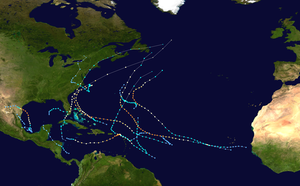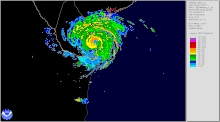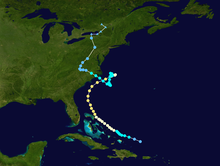| Timeline of the 1999 Atlantic hurricane season | |||||
|---|---|---|---|---|---|
 Season summary map | |||||
| Season boundaries | |||||
| First system formed | June 11, 1999 | ||||
| Last system dissipated | November 23, 1999 | ||||
| Strongest system | |||||
| Name | Floyd | ||||
| Maximum winds | 155 mph (250 km/h) (1-minute sustained) | ||||
| Lowest pressure | 921 mbar (hPa; 27.2 inHg) | ||||
| Longest lasting system | |||||
| Name | Dennis | ||||
| Duration | 14.75 days | ||||
| |||||
The 1999 Atlantic hurricane season was an event in the annual tropical cyclone season in the north Atlantic Ocean. This Atlantic hurricane season saw a near-average number of named tropical storms,[1][nb 1] though five of them became dangerous hurricanes of Category 4 intensity on the 5-level Saffir–Simpson scale, the most in a single season since 1886.[3] The season officially began on June 1, 1999 and ended on November 30, 1999. These dates, adopted by convention, historically describe the period in each year when most tropical systems form.[4] This season's first storm, Tropical Storm Arlene, formed on June 11, while the last, Hurricane Lenny, dissipated on November 23.
Altogether, 12 tropical storms formed during the season, including eight hurricanes of which five intensified into major hurricanes.[1][nb 2] There were also four tropical depressions that did not reach tropical storm strength.[3] The most significant hurricane of the season was Hurricane Floyd, which caused devastating flooding along the East Coast of the United States,[1] especially in North Carolina, which had been hit only ten days earlier by Hurricane Dennis.[6] Another strong hurricane, Hurricane Lenny became the strongest November Atlantic hurricane on record, and maintained a west-to-east track through the Caribbean for nearly its entire duration. Because of its unusual path, it developed the nickname "Wrong Way Lenny."[7] The deadliest tropical cyclone of the season was Tropical Depression Eleven, whose heavy rain and resultant flooding caused 400 deaths in Mexico.[3] Following the 1999 season, the names Floyd and Lenny were retired from reuse in the North Atlantic by the World Meteorological Organization.[8]
This timeline documents tropical cyclone formations, strengthening, weakening, landfalls, extratropical transitions, and dissipations during the season. It includes information that was not released throughout the season, meaning that data from post-storm reviews by the National Hurricane Center, such as a storm that was not initially warned upon, has been included.
By convention, meteorologists use one time zone when issuing forecasts and making observations: Coordinated Universal Time (UTC), and also use the 24-hour clock (where 00:00 = midnight UTC).[9] In this time line, all information is listed by UTC first with the respective local time included in parentheses.










